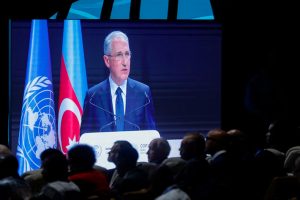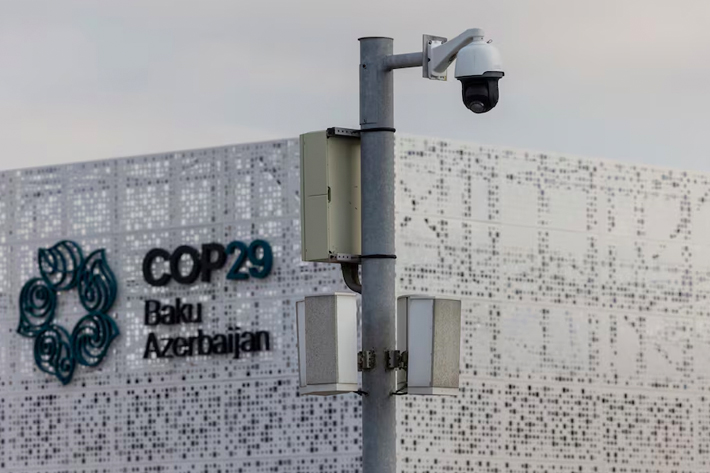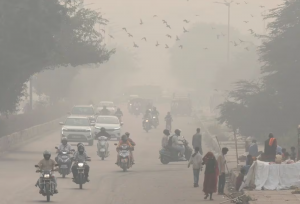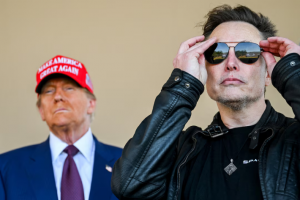The world’s biggest climate summit, COP29, kicked off in Baku, Azerbaijan on Monday, amid looming worry about Donald Trump’s re-election as the US president, and concern about major world leaders skipping the UN gathering.
“Colleagues, we are on a road to ruin. But these are not future problems. Climate change is already here,” COP29 President Mukhtar Babayev said, in his opening remarks at the summit.
“Whether you see them or not, people are suffering in the shadows. They are dying in the dark and they need more than compassion, more than prayers and paperwork. They are crying out for leadership and action,” Babayev said.
Also on AF: Scientists Say 2024 ‘Virtually Certain’ to be Hottest on Record
“COP29 is a moment of truth for the Paris Agreement… We must now demonstrate that we are prepared to meet the goals we have set ourselves,” he added.
While those were strong words, the COP29 summit’s ability to reach consensus on urgent climate action remains in shrouded in doubt, given several prominent world leaders are planning to skip the event.

Political leaders expected to stay away include US President Joe Biden, European Commission President Ursula von der Leyen and Chinese President Xi Jinping. China’s vice premier Ding Xuexiang is attending the summit instead.
Also weighing on talks is last week’s re-election of Donald Trump, a climate-change denier, who in his first term pulled the US out of the Paris Agreement. Signatories to the climate deal, signed in 2015, pledged to reduce their emissions in order to limit global warming to 1.5 degrees Celsius over pre-industrial levels.
Trump has said he will again withdraw the US from the agreement — a move that could have a cascading effect on global climate pledges.
“People will be saying, well, the US is the second biggest emitter. It’s the biggest economy in the world … If they don’t set themselves an ambitious target, why would we?” Marc Vanheukelen, the EU’s climate ambassador from 2019 to 2023, told Reuters.
Climate finance in focus
Delegates in Baku will have a lot of crucial climate issues on their plate. They are likely to continue discussions on the global shift to renewables, including accounting for progress — or a lack of it — on last year’s pledge to transition “away from fossil fuels in energy systems.”
Participating governments will also look to resolve rules for trading carbon credits earned through the preservation of forests and other natural carbon sinks; boost transparency through climate action progress reports; and set specific goals to help people adapt to climate disruptions such as warmer days, rising sea levels or parched farmlands.
But the most important issue on the docket will be a deal for up to $1 trillion in annual climate finance for developing countries, replacing a target of $100 billion.
Progress on the issue has been difficult — with months of stalled talks in the run-up to the summit. Besides, wealthy nations have only sometimes met the earlier, smaller annual goal of $100 billion since 2020.
Those issues have led to growing mistrust among the world’s climate-vulnerable nations.
“Here in Baku, we must agree a new global climate finance goal. If at least two thirds of the world’s nations cannot afford to cut emissions quickly, then every nation pays a brutal price,” Simon Stiell, executive secretary of the United Nations Framework Convention on Climate Change, said at the COP29 opening ceremony.

“If nations can’t build resilience into supply chains, the entire global economy will be brought to its knees. No country is immune,” Stiell said.
“So, let’s dispense with the idea that climate finance is charity. An ambitious new climate finance goal is entirely in the self-interest of every nation, including the largest and wealthiest.”
China’s last minute salvo
Officials like Stiell have been expressing urgency on the need to reach consensus on the climate financing goals for, at least, much of this year.
But it has been competing for attention with economic concerns, such as ongoing wars in Ukraine and Gaza.
The latest addition to that list came from China, which made a last-minute proposal to discuss trade on behalf of the “BASIC” group of countries – Brazil, South Africa, India and China.
Beijing asked for the summit to address “restrictive trade measures” such as European Union carbon border tariffs going into effect in 2026.
Those concerns have been compounded by Trump’s campaign promise to impose 20% tariffs on all foreign goods, and 60% on Chinese goods.
China’s request shows it is flexing its muscles after Trump’s election, Li Shuo, director of China Climate Hub at the Asia Society Policy Institute, said.

All political flexing aside, how COP29 negotiations pan out could significantly impact the future of our planet, that has, especially this year, seen disastrous impacts of climate change become clear and present.
The 2024 Atlantic season has seen at least nine hurricanes, which scientists say have been exacerbated by warming temperatures. Meanwhile, across the world, millions of people have battled dramatic floods, including in Africa, coastal Spain, China, and across Asia, including in northern Vietnam, Laos, Thailand, Myanmar and southern India.
And at the same time, record heat has fuelled drought across South America, Mexico and the US West. According to latest UN data, the world could warm up as much as 3.1 degrees Celsius by the end of the century — far beyond all climate pledges — due to complete inaction on managing emissions.
“The ball is back in the court of the developed countries and their populations,” Michai Robertson, finance negotiator for the Alliance of Small Island States, told Reuters.
“You all need to get your act together, or we… will suffer because of your negligence.”
- Reuters, with additional editing and inputs from Vishakha Saxena
Also read:
Trump Will Have Big Impacts on Trade, Climate Change, EVs
Floods or Drought: Climate Change Worsens Global Water Woes
China, India Ask Rich Nations For ‘Trillions’ in Climate Finance
Asian Economies at Risk From Inaction on Climate Change: ADB
Climate Change Has Cost China $32 Billion in Just One Quarter
Emissions of World’s Super Rich ‘Drive Economic Losses, Deaths’
Funding Gap Hurts Climate Talks While World Faces 3.1C Warming
Climate Change ‘Fuelled’ Rain That Led to Fatal Indian Landslides
Energy Emissions Set to Peak But ‘Not in Time’ For Climate Goals
Scientists Fear Nature’s Carbon Sinks Are Failing – Guardian
Could Melting Glaciers Trigger Volcanic Eruptions? – Reuters
























